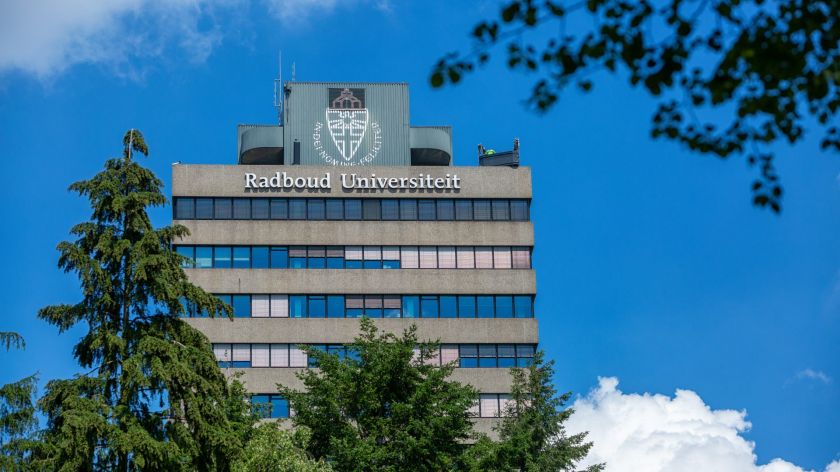Dijkgraaf allocates 200 million; modern languages to get national Bachelor’s programmes
-
 Het Erasmusgebouw. Foto: Dick van Aalst
Het Erasmusgebouw. Foto: Dick van Aalst
The universities are to receive an annual 200 million euros to foster mutual collaboration and more permanent posts. One of their plans: national Bachelor’s programmes for the modern languages French and German – but not for Dutch.
Last autumn Minister Dijkgraaf awarded an initial 60 million; this has now been followed by another 140 million. The money will go to the ‘sector plans’ by which the universities agree amongst themselves on what course to follow. This 200 million is not a one-off payment, but structural.
The money is intended to contribute towards ‘calm and space’, as Minister Dijkgraaf put it. The universities have promised to employ more staff in about 1200 permanent posts, and are making joint choices about the direction of their research.
“This is a unique operation in the history of Dutch academic policy”, wrote the committee assessing the plans for Minister Dijkgraaf. Sector plans had existed in the past, but never for all domains.
Languages
The choices concerned, for instance, the subject of sustainable energy in the Science sector plan, and medical robotics within the Technology sector plan. The most striking plan, however, affects modern languages.
Programmes for the languages Dutch, German and French have been suffering. “Despite several initiatives that aimed to turn the tide, language teaching has found itself in a vicious circle,” reported the committee. Too few students were opting to study a language, exacerbating the existing shortage of Dutch, German and French teachers. This was affecting the quality of language teaching – and that, in turn, was reducing the number of student applications.
Up to now the universities have mainly tried to keep individual university programmes up and running. “This is not particularly effective, and is untenable in the long term.”
National programmes
The committee is therefore enthusiastic about the plans submitted for national Bachelor’s programmes, to be worked out over the next few years. It expects that “these joint programmes will have started by no later than 2025-2026.”
But the Dutch language will not, after all, gain a national Bachelor’s programme. It is not yet clear why the committee was of this opinion. In his letter, Minister Dijkgraaf summarises the advice slightly differently: Dutch language programmes should strengthen cooperation.
The universities are also advised that a joint degree – that is, a single diploma awarded by different universities – should be given for these ‘modern school languages’. The same option could also be explored for other school languages suffering lecturer shortages, such as Greek and Latin.
And why provide these programmes in different cities? Is this not rather inefficient? As their report puts it: “The committee also advises exploring whether a single location for some of these programmes might be a preferable option, from a macro-efficiency standpoint.”
According to the planners, another way of reviving these language programmes would be to improve collaboration with interdisciplinary programmes, and the committee agrees. This would be with younger programmes such as intercultural communications, artificial intelligence, and minorities & multilingualism, but also more established ones such as history, communication sciences, and journalism.
Dijkgraaf
In a letter to the House of Representatives Minister Dijkgraaf praises the sector plans, in part because they lead to “clear-cut choices”. He describes the financial support as a “very important milestone and an excellent result.”
“This allocation allows the implementation of all the sector plans to begin”, Dijkgraaf writes, including the introduction of national Bachelor’s programmes in the modern languages.
Problems
The sector plans will not magically solve the problems in higher education and research, however. The committee also mentions the arrival of foreign students. “Each domain has its own bottlenecks in the area of internationalisation, and its own ideas about how to address them”, they note. The sector plans do not effectively tackle these problems.
Moreover, the Ministry is currently working on new ‘starter and incentive funding’ for researchers. These cut across national agreements, and it is not yet clear how this will work out in practice.
Permanent posts
With regard to the promised permanent posts, the committee warns against excessive haste. In recruiting a large number of lecturers the universities, “especially in today’s tight job market”, should keep a close eye on the quality of research and education, suggesting that the tempo “be adjusted in order to safeguard recruitment quality”.
Another advisory document will be published before the summer, in which the committee will examine these themes in more detail. The Nationale Commissie Sectorplannen (NCSP) is co-chaired by the chemistry professor Bert Meijer and the public administration professor Mark Bovens. The other three committee members are the family medicine emeritus professor Henriëtte van der Horst, the ecology emeritus professor Louise Vet, and the history professor Beatrice de Graaf.
Translation: Taalcentrum-VU



